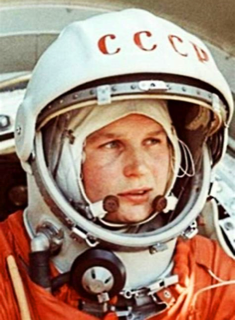On 16 June 1963, only two years after Yuri Gagarin became the first man in space, Valentina Tereshkova made world history and became the first woman in space. This was during the height of the Cold War and during the space race, in which the Soviet Union achieved tremendous feats, such as having the first space station, first artificial satellite, and first spacecraft to land on another planet, namely Venus.
The decision to launch a dual-orbit mission including a woman, with Valeri Bykovski as the second person orbiting, was made twenty years before the American mission that made Sally Ride the third woman in space, the second being Svetlana Savitskaya, also from the Soviet Union. Tereshkova was picked for her ability in parachuting, as this was needed when the Vostok craft was landing. She was able to parachute in her spare time while she worked in a textile factory at the time.
Without a worker-oriented society such as the Soviet Union, a working-class woman might never have been to space, let alone the first woman in space.
After her space flight Tereshkova toured the world as a good will ambassador, promoting equality. She travelled to Cuba in October 1963 as a guest of the Cuban Women’s Federation. She was also part of the Women’s Committee within the Communist Party of the Soviet Union and was chairperson of the committee in 1977. She was a deputy to the Supreme Soviet between 1966 and 1989, and a people’s deputy from 1989 to 1991. She also headed the USSR’s International Cultural and Friendship Union from 1987 to 1991.
Tereshkova was not only picked to fly to space but proved herself within the party many times. A working-class woman at the time being so involved in politics was achieved by altering society’s political structure. After the October Revolution in Russia, which brought the Communist Party to power, women were given opportunities they never had before, such as access to education and positions in politics.
Women such as Aleksandra Kollontai and Clara Zetkin are examples from early in the USSR of women in politics. These women have shown that it is not enough to see a woman who has been given all the opportunities that her class grants her in a position of power. Seeing women in politics continuing to serve a patriarchal state is not emancipation but a continuation of what we should be fighting against: making revolutionary changes to how we perceive gender as a society is what will emancipate those who lack opportunities to advance in society.
We must attack sexism, racism, homophobia, transphobia and other forms of bigotry equally to allow all citizens to advance in society, no matter their background or where they’re from. We must look to past and present socialist countries as examples, not to emulate but to learn from.
Valentina Tereshkova, a working-class woman who was able to visit space, shows us that the working class can do the unimaginable in a socialist society. To truly emancipate all workers regardless of gender a socialist society is needed. In such a society we can all achieve anything we set our minds to. We only need to be given the opportunity that Valentina Tereshkova was given.






